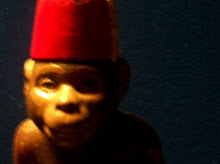Presently, Mr. Oliver, a well-natured looking man, (one thought of that,) came forward, leading and coaxing along a little black boy, dressed in white linen, somewhat fat and stubborn in build. Tom was not in a good humor that night; the evening before had refused to play altogether; so his master perspired anxiously before he could get him placed in rule before the audience, and repeat his own little speech, which sounded like a Georgia after-dinner gossip. The boy's head, as I said, rested on his back, his mouth wide open constantly; his great blubber lips and shining teeth, therefore, were all you saw when he faced you. He required to be petted and bought like any other weak-minded child. The concert was a mixture of music, whining, coaxing, and promised candy and cake.
He seated himself at last before the piano, a full half-yard distant, stretching out his arms full-length, like an ape clawing for food, -- his feet, when not on the pedals, squirming and twisting incessantly, -- answering some joke of his master's with a loud "Yha! yha!" Nothing indexes the brain like the laugh; this was idiotic.
"Now, Tom, boy, something we like from Verdi."
The head fell farther back, the claws began to work, and those of his harmonies which you would have chosen as the purest exponents of passion began to float through the room. Selections from Weber, Beethoven, and others whom I have forgotten, followed. At the close of each piece, Tom, without waiting for the audience, would himself applaud violently, kicking, pounding his hands together, turning always to his master for the approving pat on the head. Songs, recitations such as I have described, filled up the first part of the evening; then a musician from the audience went upon the stage to put the boy's powers to the final test. Songs and intricate symphonies were given, which it was most improbable the boy could ever have heard; he remained standing, utterly motionless, until they were finished, and for a moment or two after, -- then, seating himself, gave them without the break of a note. Others followed, more difficult, in which he played the bass accompaniment in the manner I have described, repeating instantly the treble. The child looked dull, wearied, during this part of the trial, and his master, perceiving it, announced the exhibition closed, when the musician (who was a citizen of the town, by-the-way) drew out a thick roll of score, which he explained to be a Fantasia of his own composition, never published.
"This it was impossible the boy could have heard; there could be no trick of memory in this; and on this trial," triumphantly, "Tom would fail."
The manuscript was some fourteen pages long, -- variations on an inanimate theme. Mr. Oliver refused to submit the boy's brain to so cruel a test; some of the audience, even, interfered; but the musician insisted, and took his place. Tom sat beside him, -- his head rolling nervously from side to side, -- struck the opening cadence, and then, from the first note to the last, gave the secondo triumphantly. Jumping up, he fairly shoved the man from his seat, and proceeded to play the treble with more brilliancy and power than its composer. When he struck the last octave, he sprang up, yelling with delight: --
"Um's got him, Massa! um's got him!" cheering and rolling about the stage.
The cheers of the audience -- for the boys especially did not wait to clap -- excited him the more. It was an hour before his master could quiet his hysteric agitation.
Sunday, March 14, 2004
Blind Tom circa 1862
Sometimes you just have to love the web. Or at least the enterprising folks who take the time to make quality material avaliable. This is an article about Blind Tom from the Atlantic Monthly published in November 1862. It provides insight into some of Tom's amazing musical abilities, but is also of interest for its display of 19th century social norms, especially regarding race and disability. Here is an excerpt in which the author describes seeing Tom perform in 1860, when he would have been 10 yrs old:


